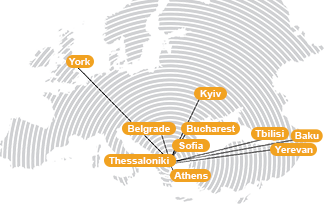In order for the European Union (EU) to be successful in the global markets, higher education institutions (HEI) must be able to produce independent, creative, entrepreneurial individuals, who understand inter- and multidisciplinary challenges of the socio-economic environment and as a result can contribute to open innovation in true convergence with technological growth. EU’s success in the global competition is heavily dependent on the ability of the economy to produce digitally based innovative enterprises with high growth potential that can give stimulus to the actors of the socio-economic environment. Creating a common framework and a unified entrepreneurial ecosystem across the EU requires a core engine of open innovation and co-creation among all the involved stakeholders in order for the inequality among the regions of the EU to be decreased. Currently, EU significantly lacks such capacities of fostering digitally driven startups in true co-creation with all stakeholders. Such requirement not only that ensures long terms sustainability and societal development by improving living conditions, but it also drives the need for more innovation and knowledge exploitation towards finding unique solutions to growth in a digitally driven quadruple helix context (university/innovation, startups/market, policy, society, investors/associations) where digital entrepreneurship (DEP) - in a quadruple helix co-creation- should be the key driver of regional and EU growth.
To this end, iSTART responds to this need by aiming to develop an innovative, evidence-based transnational framework that will markedly improve the knowledge and skills of academic institutions to produce more marked/startup oriented DEP curricula, reducing the barriers in this field. The project consortium comprises key academics, investors, incubators from different sectors who will co-create the envisaged DEP curriculum and will pilot it through an open innovation and co-creation virtual learning environment (VLE). This outcome is directly pertinent to quadruple helix-academia co-operation for innovation and best practices with respect to DEP, and can also support policy reform in this area, leading to more prepared graduates ready for the startup market. Also, iSTART will enable transnational DEP skill development/learning mobility leading to DEP homogeneity in EU towards targeting the common EU market. Overall, iSTART also follows up the recent plans of the EU to promote entrepreneurship and social cohesion as well as digitalization of higher education and of industries. This makes iSTART directly relevant to the current objectives of the participating organizations.
Additionally, iSTART is aligned with the goals of Strategic Partnerships for academia-market-society collaboration/innovation, with the Headline Education Target, Entrepreneurship 2020, Startup Europe Initiative, and with the EU Higher Education Modernisation Agenda by providing incentives for higher education internationalization, market-oriented curriculum development, and co-creation with business through integrated features that will lead on the long term of better involvement and support from the industry side to academia. Similarly, iSTART is in line with the European cooperation in education and training (ET2020) strategy by fostering life-long-learning, improving the quality of education through stakeholder engagement, and promoting creative thinking towards DEP.





